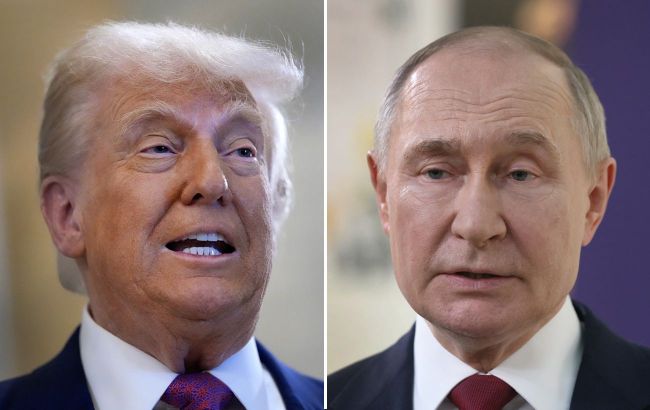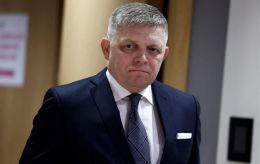Putin outplays Trump. Why US-Russia negotiations push peace further away
 Donald Trump and Vladimir Putin (collage: RBC-Ukraine)
Donald Trump and Vladimir Putin (collage: RBC-Ukraine)
The results of yesterday’s conversation between Donald Trump and Vladimir Putin shocked Ukraine and Europe. It is quite likely that the US will withdraw from the negotiation process and shift all responsibility onto the Europeans.
RBC-Ukraine explains why yesterday’s talks were discouraging for Ukraine and what to expect next.
Russia showed its unwillingness to genuinely move toward a peace agreement as early as last week in Istanbul. The head of the Russian delegation, Vladimir Medinsky, directly threatened the Ukrainians, saying that "maybe some of those sitting here at this table will lose more of their loved ones… Russia is prepared to fight forever." In addition, Russia put forward unacceptable preconditions for a ceasefire — a complete withdrawal of Ukraine from the Donetsk, Luhansk, Kherson, and Zaporizhzhia regions.
Despite this, US President Donald Trump decided to personally speak once again with Russian President Putin. Whether Trump truly hoped that this conversation could lead to a breakthrough in negotiations remains a mystery — Putin essentially confirmed his intentions to continue the war, albeit in a veiled manner.
Following the talks, Putin stated that he was "ready to work" with Ukraine on a memorandum to establish future negotiations, which could include a possible ceasefire "for a certain period." However, just a few hours later, Putin’s spokesperson Peskov said that there was "no question and cannot be any question" about the timeline for preparing such a memorandum.
In turn, after the conversation with Putin, Trump called Zelenskyy and five other European leaders to inform them of the results. According to Axios, the US president asked the Russian leader to present "something that people (obviously Ukrainians - ed.) can agree to."
At the same time, according to the Financial Times, Trump made it clear that the US would withdraw from involvement in the conflict between Ukraine and Russia and leave the countries themselves to directly negotiate a ceasefire.
Importantly, the US president spoke out against imposing sanctions on Russia, believing that "Putin is inclined to reach an agreement." Axios reports that Zelenskyy and European leaders were shocked by this news.
According to RBC-Ukraine, there were indeed high hopes in Europe and Ukraine for yesterday’s conversation between Washington and Moscow — that Trump would finally realize that Putin was leading him by the nose and would adopt some sanction measures. The reality turned out to be essentially the opposite.
Small victory for Putin
During the phone conversation with the US president, Putin effectively scored an interim win. "Trump abandoned the American plan, which Ukraine agreed to, and whose first point was a ceasefire," said diplomat and director of the Center for Defense Strategies, Oleksandr Khara, in a comment to RBC-Ukraine.
According to him, the key element in Putin’s plan is the idea of signing a memorandum. At the same time, Russia is not ready to end the war until it achieves its maximalist goals: from seizing new Ukrainian territories and preventing Ukraine’s NATO membership to imposing the Russian language and the Moscow Patriarchate.
The expert is convinced that Putin will demand what Ukraine cannot accept and justify his unwillingness to cease fire by claiming that Ukraine is allegedly unwilling to negotiate.
"It was a trick — to show that they are for a ceasefire but have no intention of doing so until Ukraine capitulates. And Trump will say: look, they fundamentally agreed to a ceasefire, now all that’s left is to sign this paper, and so on," Khara explained.
However, something like this was to be expected from Putin, especially knowing that Trump is primarily interested in progress in the negotiations. "It was clear that Putin would use this opportunity again; he knows which pressure points to apply to get Trump to meet him halfway. And that’s exactly what Trump did," political scientist Ihor Reiterovych told RBC-Ukraine.
American way out
All this means that the struggle for Trump’s position continues. The main goal of Ukraine and Europe is still to convince the US president that Putin has no intention of making peace. During the mentioned conversation between Trump and European leaders, Zelenskyy noted that past negotiations with Putin yielded nothing and called for increased pressure on Russia.
"Trump is now entering a kind of ‘hangover’ phase, to some extent, after the conversation with Putin. Plus, I still hope that European leaders will keep communicating with Trump and help clear his mind a bit. But whether Trump will be ready to make any radical changes, I think we will be able to say in 2 to 4 weeks," said Reiterovych.
On May 20, during a press briefing, the US president gave a similar timeline — but in the context of Ukraine.
"I think Zelenskyy is a strong guy. And he’s not the easiest person to deal with. But I think that he wants to stop. It's a very bad thing that's happening over here. I think he wants to stop. But I could answer this question better in two weeks or four weeks from now," Trump said.
The chances that Russia will change its position in this time are slim. "Those who have studied international relations and strategy understand that the most important thing is capabilities and the balance of power on the frontline. These then convert into some diplomatic conditions, demands, and so on. Nothing has changed here," Khara told the outlet.
So, Trump will have two options going forward. The first is for the US to withdraw from the negotiation process. This possibility has been mentioned both by Trump himself and members of his team since the US president has many other issues at home and around the world. The second option involves starting to pressure Russia through sanctions.
"Which option he chooses will depend on who he talks to last — European leaders or Putin himself," Reiterovych emphasized.
However, there are some positives for Ukraine in this situation. Trump’s actions clearly confirm that Ukraine and Europe need to rely only on themselves.
"The good news in all this is that Europe has become even more ‘in the same boat’ with Ukraine and now realizes it can’t rely on anyone else. Many illusions about Trump have been shattered," political scientist Oleh Saakian told RBC-Ukraine’s YouTube channel.
The very next day after Trump’s conversation with Putin, the European Union voted for the 17th package of sanctions against Russia (though these events were not directly connected) and is already preparing the next package. This is certainly a good signal for Ukraine. However, without US involvement, the sanctions pressure on the aggressors will not be painful enough to force Putin to take any constructive steps. Additionally, the question remains open as to how exactly the US will "exit the process" and whether aid to Ukraine will continue in any form (for example, through the ability to keep buying American weapons). But likely even Trump himself doesn’t have answers to this yet.
Sources: statements from Ukrainian, Russian, and American politicians, materials from Axios, CNN, and Financial Times, as well as comments from Oleksandr Khara, Ihor Reiterovych, and Oleh Saakian.

